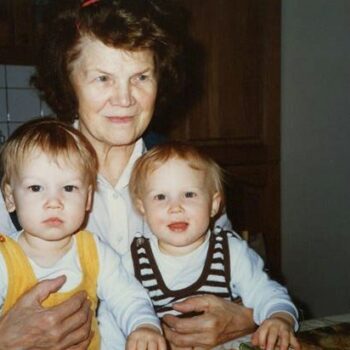Matthew Adams

My wife’s grandmother holding my wife, Nina (right), and Nina’s twin brother. While the news that a loved one has dementia may be distressing, children may be relieved to know that the person’s behavior is being caused by dementia and is not directed toward them.
January 30th, 2018
Matthew Adams and his wife founded The Ally Bally Bee Project, which helps families create personalized children’s books about dementia, after his wife’s grandmother was diagnosed with Alzheimer’s.
Dementia is difficult enough for adults to comprehend, so how do you explain dementia to children? The idea of creating a personalized children’s book about dementia came to me a few years ago, after my wife’s grandmother was diagnosed with Alzheimer’s. One evening, my family and I sat around our table, discussing how her grandmother was acting and what she was saying. Since my wife and I were still trying to understand the situation, I wondered how I could explain granny’s dementia to my daughter. The question “How do you explain dementia to a six year old?” stuck with me and formed the basis of our project’s mission. Children’s books about dementia and personalized children’s books exist, but we decided to combine the two concepts so that families can help their children better understand a loved one’s dementia. Families can edit the book so that character names and dementia-related behavioral traits are tailored to their situation.
Since dementia can create challenging situations for families and social groups, it is difficult to know how much you should explain to children. It is natural to want to protect children from difficult or confusing situations, but the book encourages and helps parents to be honest with their children about a loved one’s dementia. There are several reasons why it is important to explain dementia to children:
- Children are often aware of a tension-filled atmosphere, even when they haven’t been told the facts: It can be reassuring for children to understand what the problem is so that they can better cope with this atmosphere. While the news that a loved one has dementia may be distressing, children may be relieved to know that the person’s behavior is being caused by dementia and is not directed toward them.
- It can be more upsetting for children to find out later in life that their loved one had dementia than to cope with the reality of what is happening: If children are not told about their loved one’s dementia upfront, they may find it difficult to trust what someone who is close to them tells them later in life.
- Seeing how people around them cope with difficult situations is good for children: Children will learn valuable skills about dealing with distressing situations so that they can better manage painful emotions in the future.
My wife and I are on a mission to make difficult conversations about dementia a little easier for families worldwide so that their children can cope with their loved one’s dementia.